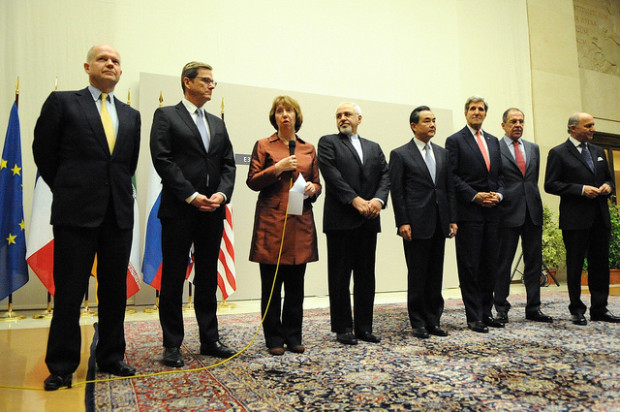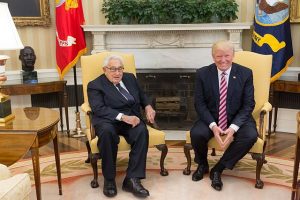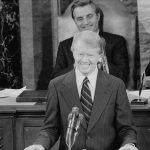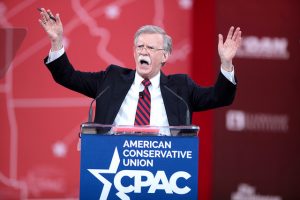by Peter Jenkins
On Dec. 2 the Wall Street Journal published an article entitled, What a Final Iran Deal Must Do. The authorship is ascribed to Henry Kissinger and George Shultz, but it is hard to believe that this piece is really the work of such distinguished statesmen, so striking are the misleading depictions of crucial facts and the shortcomings in their reasoning.
The authors open by reminding readers of their Cold War experience of confronting “nuclear perils”, implying an analogy between a Soviet Union that by the 1970s possessed tens of thousands of nuclear weapons and an Iran which at present possesses no more than an unproven, very basic and as yet unused nuclear weapons capability.
They go on to argue for the dismantling or mothballing of parts of Iran’s nuclear infrastructure, omitting to mention that they never tried to persuade the USSR (or China) to dismantle any of their nuclear infrastructure (and would have been given short shrift, had they done so). Instead, they negotiated balanced arms control agreements that reduced “nuclear perils” by improving mutual understanding and providing for confidence-building verification measures.
In addition, they write as though there is a clear distinction between a nuclear weapons capability and a “plausible civil nuclear program” (to which they, rightly, raise no objection). The essential problem posed by a dual-use nuclear technology like uranium enrichment is that no such distinction exists. An enrichment plant that is producing fuel for reactors one day can be reconfigured the next to produce weapons-grade uranium.
Because that is the case, it is a mistake to fixate on technical capabilities. Far more useful is to minimise the risk that a state that possesses nuclear weapons potential will ever want to realise it. The world is full of states that possess the capacity to inflict death and destruction on other states. Mercifully, most of that capacity remains unused because most governments are smart enough to recognise that picking a fight is a pretty dumb thing to do, i.e. not in the national interest, in a post-1945 world.
So it would have been wise of the authors to focus, not on a misleading distinction between civil and military capacities, but on the desirability of developing the mutual understanding that they, in their prime, were so adept at fostering, and on confidence-building verification measures.
It would also have been reassuring if they had shown awareness of the divergence of outlook that has been a discernible characteristic of Iran’s leading politicians since the late 1980s. President Rouhani’s outlook has little in common with his predecessor’s. He shares with former presidents Rafsanjani and Khatami a pragmatic and defensive mind-set. None of these three leaders (all are still alive) seeks to export Iran’s 1979 Islamic revolution. Defending Iranian interests is their guiding objective.
A penchant for treating facts misleadingly transpires in the authors’ description of Iran’s nuclear program. They write as though it had been established beyond all doubt that this is a military and not a civil or safety-net dual-use program. It has not.
They also imply that the program is on a vast scale, whereas in fact it is modest. Nearly eight years after the re-opening of the Natanz plant (following a negotiated two year suspension of activity there) Iran only possesses enough low-enriched uranium for four nuclear weapons (which it has not attempted to make). Its stock of LEU would barely supply one quarter of the fuel needed to re-load its 930MW power reactor at Bushehr. The 40MW reactor at Arak is still incomplete.
Here are a few more egregious statements:
…progress on a heavy water reactor and plutonium reprocessing facility at Arak
There is no trace of a reprocessing facility at Arak or anywhere else in Iran. Since 2003 Iranian negotiators have steadily disclaimed any intention of reprocessing spent fuel from any of their reactors.
IAEA directives have demanded…unconditional compliance with an IAEA inspection regime
The International Atomic Energy Agency’s board resolutions (which only have political, not legal force) have urged Iran to grant exceptional access to IAEA inspectors. Iran has complied with the regular Nuclear Non-Proliferation Treaty (NPT) inspection regime.
…we must avoid an outcome in which Iran…emerges as a de facto nuclear power leading an Islamist camp.
Do the authors really envisage Turkey, Egypt, Saudi-Arabia, Iraq and Pakistan hailing Iran as their leader? They ought to know better.
…[Iran has] proceeded with a major nuclear effort…in violation of its NPT obligations
None of the nuclear facilities built by Iran is outlawed by the NPT. Since 2003 the IAEA has reported regularly that all nuclear material known to be in Iran’s possession is in peaceful use, as required by the NPT, and has not reported any evidence of undeclared nuclear material.
The flaws in this article matter because the ostensible authors are so distinguished that they are likely to be seen as authoritative sources of wisdom on the subject at issue. This impertinent critique of their analysis stands little chance of correcting the perceptions of those who have been influenced by this Dec. 2 piece. Nonetheless, here’s hoping.






Giving any credence to Henry Kissinger’s and George Shultz’s honesty is stretching diplomacy to the breaking point. Nor does it fly as satire.
Aside from those two small critiques, nicely said.
Dear Mr Jenkins. We would not have reached this official/ journalistic shambles had the western media’s onslaught against Iran/Iranians been strongly challenged by genuine investigative journalists and independent thinkers/politicians at the very beginning of the unleashing of the anti-Iranian propaganda decades ago, or had there been efficient press regulations that would have restricted such poisonous misleading crusade to condition the perceptions of the American public.
One wonders at the western proclamations such as the ‘western free press’, the western ‘free world’, and that as a result of the western quest for hegemony how many misleading ‘factual’ reports by the American administrations and pro-Israeli media have been issued on the Middle East in the past 30 years, and how many people have perished in the Middle East in the name of American ‘national interest’, and ‘democracy’ since 1979. From Carter to Reagan…to Obama, their eras are littered with speeches on ‘democracy’ and ‘human rights’ while their victims fell in their 10,000s respectively in El Salvador, Nicaragua,…., in Iran, Lebanon, Palestine, Iraq,…., Pakistan and Afghanistan.
‘Overreacting’ sanctimoniously, American politicians magnify their concern for ‘democratic’ principles to either militarily or politically intervene in other countries – the very principles that the American administrations have continued to violate in their foreign policies. The Reagan rhetoric on the ‘free world’ in Latin America is now Obama’s rhetoric on ‘democracy’ in the Muslim World, so is his domineering interventionism policy under the guise of enforcing democratic principles. The only part of the world that such principles are never mentioned and never applied is the appalling human condition that the Palestinians are subjected to in the occupied territories and not until 1970s any media in America would dare mention their name, so much for the American free press. Thanks to the efforts of people like the late Edward Said. Thank you Mr Jenkins.
I think it is actually very much in Iran’s own best interests, for Iran to get rid of all but perhaps 3000 centrifuges, to close Fordow, convert Arak to light-water reactor, etc etc.